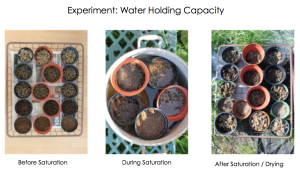Finally! I have completed my three weeks worth of internship at Bioretur. Because the three weeks were stretched through the past few months, it certainly feels longer and I have learnt A LOT. I will follow up very soon with my thoughts and reflections in a final blogpost, and so here, I will focus more on what I had done.
It had been a busy but exciting time for everyone working at the office and processing facility in Indre Arna. Earlier, I had been given the task of figuring out how to raise the nutrient levels of their pelleted manure-based fertilizer, as driven by market demand for different applications. Much of my time at Bioretur had been spent on this task, researching and evaluating the pros and cons of different options – all the time keeping in mind to find a balance between economic cost, customer needs and the environment. Not easy I tell ya!
Towards the end of my time at Bioretur, I squeezed in a little experiment to evaluate the water-holding capacities of the pelleted fertilizer, in comparison to peat moss and regular, unamended soil. Soil´s ability to absorb and retain water is obviously an important factor affecting plant growth. In general, soil that holds generous amount of water not only allows more water available for plant growth, but is also less prone to leaching of nutrients. Since the pellets are essentially organic waste materials that have been compacted and pasteurized, they quickly turns into humus when used or added to soil. We thus hypothesize that they have high water holding capacities, along with other soil amendment characteristics that make them a great – and certainly more environmentally-friendly – alternative to peat moss.
With the very limited equipments I had, I could only devise a simple experiment to estimate this property. The “proper” method would otherwise involve application of suction pressure to drain excess water out of soil sample that is previously water-saturated. Later on, I got to practise the stats and R skills from the BIO300 and BIO302 courses I´d taken at the university. Some lessons learnt: my kitchen scale is not a reliable weighing instrument, and do NOT play around with sh*t inside your dining room.
Tbc…
